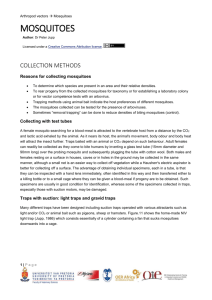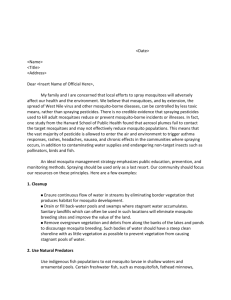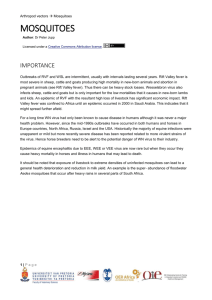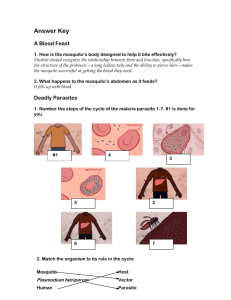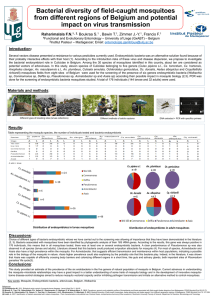Saving Lives With Smelly Feet
advertisement
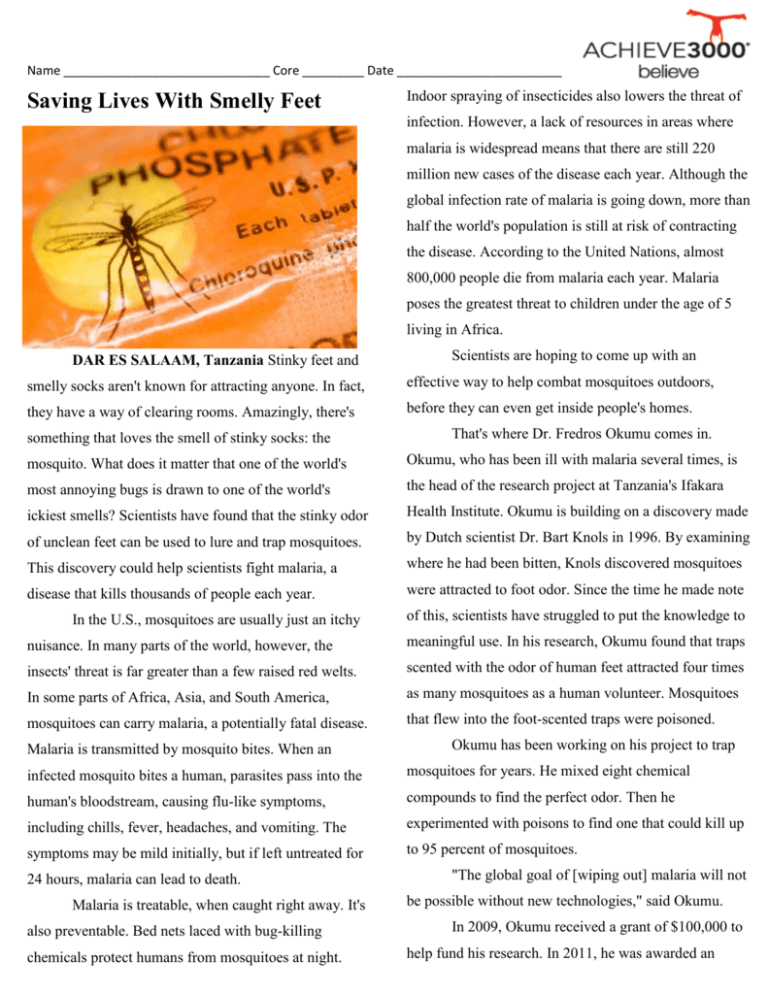
Name ______________________________ Core _________ Date ________________________ Saving Lives With Smelly Feet Indoor spraying of insecticides also lowers the threat of infection. However, a lack of resources in areas where malaria is widespread means that there are still 220 million new cases of the disease each year. Although the global infection rate of malaria is going down, more than half the world's population is still at risk of contracting the disease. According to the United Nations, almost 800,000 people die from malaria each year. Malaria poses the greatest threat to children under the age of 5 living in Africa. DAR ES SALAAM, Tanzania Stinky feet and Scientists are hoping to come up with an smelly socks aren't known for attracting anyone. In fact, effective way to help combat mosquitoes outdoors, they have a way of clearing rooms. Amazingly, there's before they can even get inside people's homes. something that loves the smell of stinky socks: the That's where Dr. Fredros Okumu comes in. mosquito. What does it matter that one of the world's Okumu, who has been ill with malaria several times, is most annoying bugs is drawn to one of the world's the head of the research project at Tanzania's Ifakara ickiest smells? Scientists have found that the stinky odor Health Institute. Okumu is building on a discovery made of unclean feet can be used to lure and trap mosquitoes. by Dutch scientist Dr. Bart Knols in 1996. By examining This discovery could help scientists fight malaria, a where he had been bitten, Knols discovered mosquitoes disease that kills thousands of people each year. were attracted to foot odor. Since the time he made note In the U.S., mosquitoes are usually just an itchy of this, scientists have struggled to put the knowledge to nuisance. In many parts of the world, however, the meaningful use. In his research, Okumu found that traps insects' threat is far greater than a few raised red welts. scented with the odor of human feet attracted four times In some parts of Africa, Asia, and South America, as many mosquitoes as a human volunteer. Mosquitoes mosquitoes can carry malaria, a potentially fatal disease. that flew into the foot-scented traps were poisoned. Malaria is transmitted by mosquito bites. When an Okumu has been working on his project to trap infected mosquito bites a human, parasites pass into the mosquitoes for years. He mixed eight chemical human's bloodstream, causing flu-like symptoms, compounds to find the perfect odor. Then he including chills, fever, headaches, and vomiting. The experimented with poisons to find one that could kill up symptoms may be mild initially, but if left untreated for to 95 percent of mosquitoes. 24 hours, malaria can lead to death. Malaria is treatable, when caught right away. It's also preventable. Bed nets laced with bug-killing chemicals protect humans from mosquitoes at night. "The global goal of [wiping out] malaria will not be possible without new technologies," said Okumu. In 2009, Okumu received a grant of $100,000 to help fund his research. In 2011, he was awarded an additional $775,000 by the Bill and Melinda Gates The current traps are expensive trial models, but Foundation and Grand Challenges Canada. The money Okumu hopes to produce affordable traps that can be was given to help Okumu create an affordable mosquito sold for between $4 and $27 each. trap that can be used outside homes. Okumu said more research is needed to find the "It's African innovation for an African problem being developed in Africa," said Dr. Peter A. Singer, the right place to put the traps. The traps would expose head of Grand Challenges Canada. "It's bold, it's humans to greater risk of bites if placed near homes. Yet innovative, and it has the potential for big impact....Who they would not be effective if they were placed too far would have thought that a lifesaving technology was away. lurking in your laundry basket?" Dictionary impact (noun) effect innovation (noun) inventiveness insecticide (noun) something used for killing insects parasite (noun) plant or animal that lives in or on another living thing transmit (verb) to transfer from one person or thing to another Multiple Choice: Circle the letter of the choice the best completes the statement. (2 points each) 1. According to the article, why did Dr. Fredros Okumu scent 5. This article would be most useful as a source for a student mosquito traps with the odor of human feet? research project on __________. A. Okumu wanted to come up with an effective way to trap the mosquitoes indoors. B. Okumu wanted the mosquitoes to be tricked into believing there were no humans nearby. C. Okumu based his traps on research done by a Dutch A. Ancient African history B. Various careers in science C. The early life of Bill Gates D. World health innovations 6. Which part of the word insecticide must mean killer? scientist, who found that mosquitoes are attracted to A. Ins stinky human feet. B. Secti D. Okumu based his traps on the requirements of the Bill C. Cide and Melinda Gates Foundation, which gave him a D. Ect grant to work on the traps. 2. This article talks mainly about __________. 7. This article is placed in a category of news called "Science Scene." In which other category would this article fit best? A. How malaria is transmitted from one human to another A. Across the U.S. B. How an African researcher learned about mosquito B. Computer Connections traps C. How researchers determined that mosquitoes like the smell of feet D. How an African researcher is trying to combat a serious illness 3. Which is the closest synonym for the word transmit? C. Politics Then and Now D. World Beat 8. Which passage from the article best supports the idea that Dr. Fredros Okumu's concept has been favorably received by some important people? A. Okumu is building on a discovery made by Dutch A. Cure scientist Dr. Bart Knols in 1996. By examining where B. Observe he had been bitten, Knols discovered mosquitoes were C. Reveal attracted to foot odor. D. Spread 4. Based on the article, the reader can predict that __________. A. Dr. Bart Knols will give Dr. Okumu money to help make the traps less expensive. B. Dr. Bart Knols will conduct research on ways to lure mosquitoes closer to large cities. C. Dr. Okumu will look for more human volunteers to help trap the mosquitoes. D. Dr. Okumu will try different ways of making the mosquito trap inexpensive. B. The current traps are expensive trial models, but Okumu hopes to produce affordable traps that can be sold for between $4 and $27 each. C. Okumu has been working on his project to trap mosquitoes for years. He mixed eight chemical compounds to find the perfect odor. D. In 2011, he was awarded an additional $775,000 by the Bill and Melinda Gates Foundation and Grand Challenges Canada. Opinion Question: Do you think Dr. Fredros Okumu's mosquito traps will be widely used? Thought Question: List at least four questions raised by the news article. Which question do you consider most important to answer? Explain your reasoning. (5 points) Math- If a mosquito trap attracts 280 mosquitoes and kills 95 percent of them, how many of the mosquitoes will not be killed?
